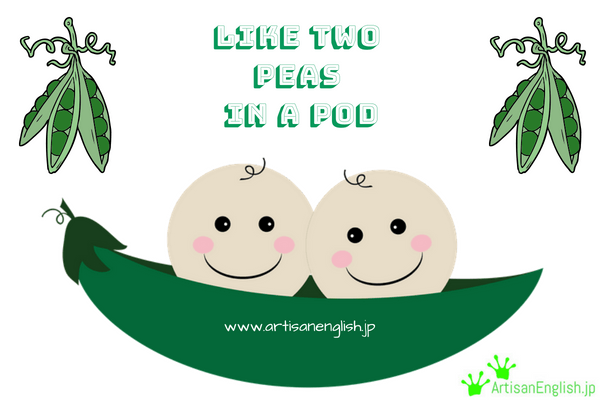
YouTube / iTunes / Spotify / Radio Public / Pocket Casts / Google Podcasts / Breaker / Overcast
Listen to ArtisanEnglish.jp posts & lesson intros here.
Phrase: Like two peas in a pod
The expression like two peas in a pod is used to compare two very similar things.
Probably, we’ve all had the experience of knowing two people who were excellent friends.
They were almost like twins.
They did everything together.
They dressed the same way.
They wore their hair in the same hairstyle and probably even went on double dates.
If you look back, I’m sure you can visualize someone in your past who was like this.
Perhaps it was you.
Maybe you have a very good friend now.
You are BFFs (best friends forever) and are still so much alike that you are like two peas in a pod.
There’s nothing wrong with that.
In my opinion, like is attracted to like, although my wife tells me that women tend to become upset when they see another lady wearing the same shoes as they are.
Very close friends are but one example of an occasion when the expression like two peas in a pod can be used.
Another one is father-son or mother-daughter relationships.
Again, I’m sure you know what I mean.
Some sons look precisely like their fathers.
The likeness is so close that it’s as if the father was digitally mapped, and then a miniature was 3D printed.
The similarities can be uncanny sometimes.
A daughter may walk the same way her mother walks or toss her head to get the hair out of her eyes as her mom does.
When you notice this, you can say they are like two peas in a pod.
My wife and I are also like two peas in a pod.
We have the same thoughts at the same time.
We like the same sports, foods, and types of alcohol for the most part, but she says whiskey and rum are too ‘stinky.’
Flesch-Kincaid Readability Test
This post is understandable by someone with at least a 6th-grade education (age 11).
On the Flesch-Kincaid reading-ease test, this post scores 82.
The easier a passage is to read, the higher the score on a scale of 0 – 100.

